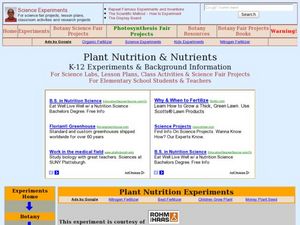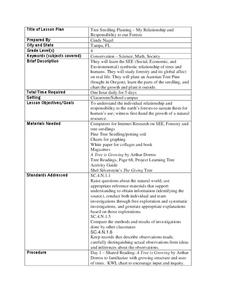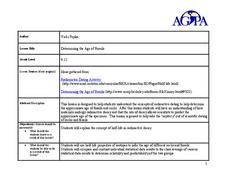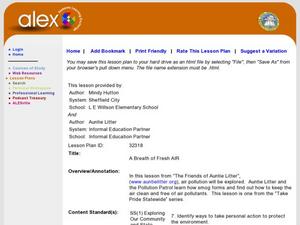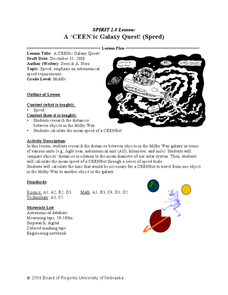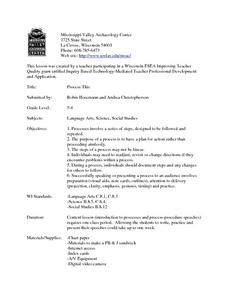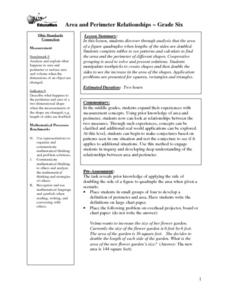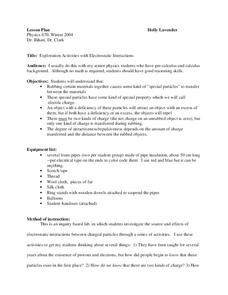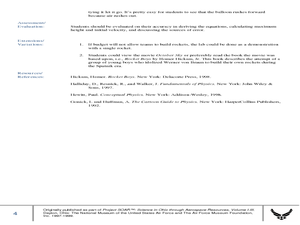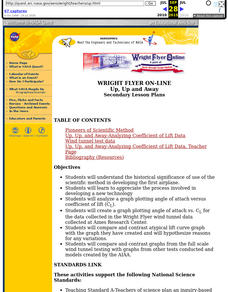Curated OER
Water Density Boundaries
Students create observable layers in water that represent a separation based upon density differences. They model density boundaries using differences in temperature and salinity. They, in groups, perform a meaningful experiment...
Curated OER
Make My Number
Fourth graders relate decimal fractions to common fractions and practice writing decimals as fractions. Through inquiry and game play they write decimals and fractions using the correct form. The first team to correctly answer the...
Curated OER
Plant Nutrition and Nutrients
Students observe seeds growth and examine the different parts of the seedling. In this biology lesson, students compare the growth of seeds planted in soil and in hydroponics. They record their observations in their science journal and...
Curated OER
Where are all the Animals?
Students view animals that camouflage at the Shedd aquarium website. In this camouflage lesson, students recognize that there are different types of camouflage, cryptic coloring, counter-shading, warning coloration and mimicry. Students...
Curated OER
Fostering Geospatial Thinking: Space to Earth: Earth to Space (SEES)
High schoolers locate and access data to help them with their science inquiry. In this geographical positioning lesson students evaluate and compare data sets.
Curated OER
What's The Matter: A Sinker or Floater?
Young scholars conduct an experiment. In this water lesson, students watch the lesson "Float and Sink" on an interactive website. Young scholars learn how to test items in water and then work in groups to test their items. Students...
Curated OER
Tree Seedling Planting- My Relationship and Responsibility to our Forests
In this trees lesson plan, 4th graders read the book, A Tree is Growing and complete a KWL chart on how trees grow and how they are used. Students research the symbiotic relationship of humans and trees, create tree collages, plant a...
Curated OER
Pasta Bridges
Students analyze the correct use of technology as it relates to math and science. In this science instructional activity, students investigate force and weight as it relates to building an object. They build a bridge and draw conclusion...
Curated OER
Determining the Age of Fossils
Students examine the concept of radioactive dating. In this radioactive dating lesson plan, students investigate how to determine the ages of fossils and rocks as they learn about half-life radioactive decay.
Curated OER
Exploring the Beach
Students explore the beach. In this marine habitat instructional activity, students inspect sand grains, design beach profiles, classify marine life, and examine natural beach habitats. Students use spreadsheets to record data from their...
Curated OER
A Breath of Fresh Air
Students explore the primary function of the respiratory system in multiple activities. In this respiratory system lesson, students build a model of the respiratory system to investigate how the lungs work.
Curated OER
The Time of Man
Students demonstrate visually Mankind's relative place on the earth's timeline. They familiarize themselves with the use of the metric system in measuring and producting a timeline.
Curated OER
Rain, Rain, Go Away
Students conduct a number of experiments involving evaporation and condensation. They view and discuss a video about the water cycle and then design posters about the rain based on the book "Cloudy With A Chance of Meatballs".
Curated OER
A CEENic Galaxy Quest!
Students research the distances between objects in the Milky Way. In this astronomy lesson, students calculate the time it would take for a robot to travel from Milky Way object to another. They create a travel package for customers...
Science 4 Inquiry
The Ups and Downs of Populations
As the reality of population decline across many species becomes real, pupils learn about the variables related to changes in populations. They complete a simulation of population changes and graph the results, then discuss limiting...
Cornell University
Mechanical Properties of Gummy Worms
Learners won't have to squirm when asked the facts after completing an intriguing lab investigation! Hook young scholars on science by challenging them to verify Hooke's Law using a gummy worm. Measuring the length of the worm as they...
Curated OER
Process This
Students chart the steps, including the problem-solving tangent, and discuss the idea of procedures serving to give us a "road map" or guide to help tackle tasks with preparation and forethought.
Curated OER
Area and Perimeter Relationships
Sixth graders explore the relationship between area and perimeter. After discovering the definition of perimeter, 6th graders work together to create designs for a flower bed. They observe that the perimeter remains constant even...
Ohio State University
Exploration Activities with Electrostatic Interactions
Step out of the 21st century and discover protons and electrons through observation. Using common materials, participants continually adjust their explanation of charges. The final assessment requires pupils to design their own...
Curated OER
Look at Those Leaves!
Students research tree leaves. In this tree leaves instructional activity, students observe, measure, and sort tree leaves. Students examine leaves individually, in groups, and in relationship to the entire tree.
Curated OER
Balloon Rocket
Students observe a balloon rocket and how it relates to Newton's Third Law of Motion. In this balloon rocket lesson plan, students make a balloon rocket out of balloons, clothespins, straw, fishing line, and duct tape.
Curated OER
Rockets: Kinematics or Energy?
Students construct model rockets, measure and record the height of the launch. In this creative lesson students use different methods to calculate velocity and height data from their launched rockets.
Curated OER
Untitled Document Aerospace Team Online:
Students explain the historical significance of use of the scientific method in developing the first airplane and appreciate the process involved in developing a new technology.
Alabama Learning Exchange
I Will Survive
Young scholars explore animal adaptations. In this animal science instructional activity, students watch the video "Kratt's Kreatures" and work in groups to complete a worksheet about animal adaptations.




